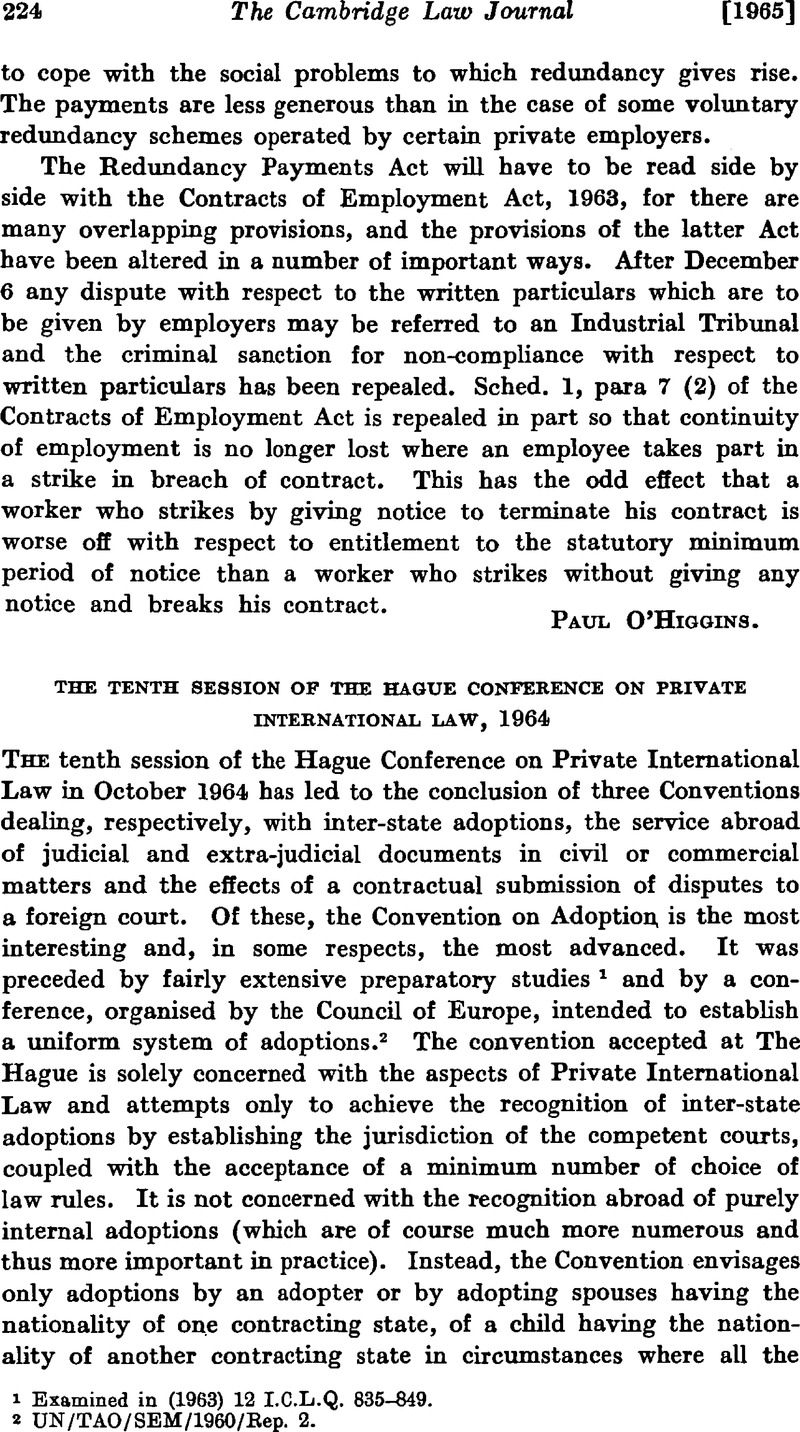No CrossRef data available.
Published online by Cambridge University Press: 16 January 2009

1 Examined in (1963) 12 I.C.L.Q. 835–849.
2 UN/TAO/SEM/1960/Rep. 2.
3 Convention on Guardianship of June 12, 1902, art. 2 (Martens, 2 ser. XXXI. p. 724); Convention on Lunatics of July 17, 1905. art. 4 (Martens, 3 ser. VI. p. 490); Draft Convention on Succession of 1928, art. 15 (2) (Actes de la Sixiëme Conference de la Haye, 1928, I. p. 405Google Scholar); Convention to regulate Conflicts between the Law of Nationality and the Law of the Domicile of October 31, 1951, art. 5 (Actes, 1951, I. p. 388)Google Scholar; Convention on the Choice of Law in respect of Maintenance Obligations towards Children of October 3, 1956, arts. 1 (1) (2), 2 (c), 3 (Actes, 1956, II, p. 348Google Scholar); Convention concerning the Jurisdiction and the Choice of Law in matters of Protection of Minors of October 5, 1960, arts. 1, 9 (1) (Actes, 1960, I, p. 308Google Scholar); Convention on the Form of Testamentary Dispositions of October 5, 1960, art. 1 (d) (Actes, 1960. I, p. 304Google Scholar).
4 Hague Convention on Double Nationality of April 12. 1930, art. 5 (Cmd 5553; U.K. Treaty Series No. 33 of 1937).
5 Geneva Convention on the Status of Refugees of July 28, 1951, arts. 1 (A) (2), 14, 16 (2) and (3) (Cmd 9171; U.K. Treaty Series No. 39 of 1954).
6 European Convention on Establishment of December 13, 1955, arts. 9 (1); 30 (2) and Protocol, Section VIII and art. 30 (European Treaty Series, No. 19).
7 Actes 1928, I, 67, 87, 97Google Scholar; Actes 1951, I, 228, 232Google Scholar; Actes 1956, II, 127Google Scholar; Actes 1960, IV, 225Google Scholar; see also Cassion, Hague Recueil, 34 (1930, IV) 659, at p. 778.
8 Actes 1900, I, 103Google Scholar; 1902, II, 94; Actes 1956, II, 127Google Scholar; Actes 1960, II, 225.Google Scholar
9 Cf. European Convention on Establishment of December 13, 1955, Protocol, Section VIII ad art. 30 (European Treaty Series, No. 19).
10 Cf. Niboyet, Cours de droit international privé (1946), No. 245, pp. 224–225, who equates it with the “domicile de fait” of French law before the reforms of 1927; Syndic Mahy v. Syndic Baudry, Cass, April 11, 1927Google Scholar, Revue de droit international privé, 23 (1928), p. 654Google Scholar; see also Huss, Actes, 1951, I. 229.
11 Art. 29 of the Introductory Art. to the German Civil Code; Kegel in Soergel-Siebert, Kommentar zum BGB, 9th ed. 1961, ad art. 29, para. 13, p. 960; Nagel, Rabel's. Z. 1957, 183; Stoll, ibid. p. 192; ca. Mann, F. A., Juristen-zeitung, 1956, p. 468.Google Scholar
12 Wills Act, 1963, s. 1.
13 Hopkins v. Hopkins [1951] P. 116, 121Google Scholar; Stransky v. Stransky [1954] P. 428, 437Google Scholar; but see Lewis v. Lewis [1956]Google Scholar 1 W.L.R. 200, 206.
14 Cf. Lewis v. Lewis [1956]Google Scholar 1 W.L.R. 200, 206.
15 Article 11 defines the meaning of national law, if the lex patriae consists of a composite legal system. This technique was also employed in other Hague Conventions concluded after the Second World War. See also Wills Act, 1963, s. 6 (2) (b).
16 Aden, Aden High Commission, British Solomon Islands, Cayman Islands, Falkland Islands, Gilbert and Ellice Islands, Mauritius, New Hebrides, St. Helena, Tristan da Cunha, Turks and Caicos Islands.